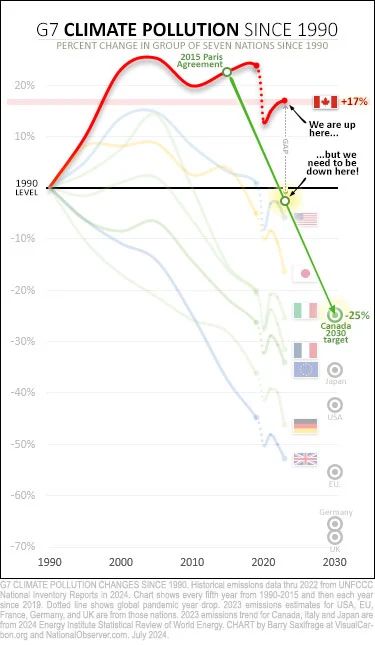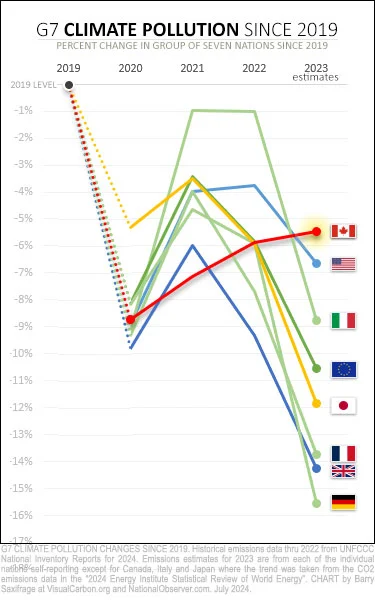Omer Aziz is the author of Brown Boy: A Memoir and a Radcliffe Fellow at Harvard University.
For much of the past decade, I spent time going back and forth between the United States and Canada. It used to be the case, especially after the election of Justin Trudeau in 2015, that when returning to Canada I was greeted by good news. The country was imbued with a sense of optimism. The beginnings of an economy that worked for everyone. A renewed confidence on the world stage. The country felt ready for the future.
After the election of Donald Trump, landing in Toronto or Montreal was accompanied by a sigh of relief. At least up here, institutions were seemingly working. At least up here, the populist wave had not crashed onshore just yet. Up here, the economic game did not seem so rigged. How brief that moment was.
Those years seem so long ago. The Canada of 2024 feels like a different country.
When I returned to Canada in late 2023, I was shocked by what I saw and heard. It felt as if almost everyone I encountered now, of all ethnicities, backgrounds and ages, were angry. Friends complained about the impossibility of buying a home − homes that had been affordable when their parents came to Canada. Family members worried about car thefts and other crimes. People were making plans to leave − even those who had recently arrived.
Nor was this limited to my immediate circle. In conversations at the local YMCA, the coffee shop and around Toronto, there was a genuine, visceral frustration. People felt stifled by the dismal state of the economy and the poor state of housing. They were working harder and, thanks to inflation, making less. The price of food (and everything else) was rising. They worried about their kids’ safety. There was a ceiling on their ambitions. The political leadership of the country had failed them, time and again, and was now unable to address ordinary people’s concerns.
At first, I thought some of this might be hyperbole. But then, after being back here for some time, I saw it myself. Driving through the Greater Toronto Area, I saw how much more congested everything had become. There were too many people with too few places to live. The increasing number of homeless people on the street. The rise in violent crime. The staggering toll of the opioid crisis. The unprecedented wave of international students, many of whom were sold a bill of goods that turned out to be faulty. The hangover from COVID-19 restrictions, almost a form of national PTSD. The pervasive feeling that success is out of reach in Canada, and even if you work hard and are successful, the government will come collecting more than they need − and then proceed to waste it, overspend it or lose it.
What I realized soon thereafter was that this country was witnessing a systemic political failure, a complete inability of politicians to get change done in ways that manifested at the dinner table. An extreme form of PR and image-management had begun to take over delivering on policy in concrete ways − and the entire country was noticing. Nor was this an accident, the unfortunate consequence of polarization or inequality, but the deliberate result of multiple policy failures − as well as failures of will.
I realized that this systemic government failure amounted to something worse than just incompetence or ineffectiveness. It was a betrayal of the Canadian dream.
What is the Canadian dream? It was a promise − less individualistic and gun-friendly than the American version, but no less ambitious. To me, the dream promised that every person here could have a decent shot at life, one that was better than that of their parents. There was emphasis on community and a strong focus on order and good government. The compact included the payment of higher taxes, and in exchange, the existence of world-class social institutions delivering for ordinary people. The immigration system worked because the same contract existed with immigrants − that they would work hard, play by the rules, become part of Canadian society through legal means, and in return, would become citizens of a highly functioning democracy where a good life was, if not guaranteed, then within reach.
The dream was based on fairness, on merit, on policies that worked. It promised breathable air and the bountiful resources of the second-largest country on Earth. It promised the principle of equality of opportunity, promised safety and peace and responsibility. It promised leaders who put the national and long-term interests of the country above their own partisan needs. The dream now feels like it’s on life support.
Canadians are not fools; their discontents have good reason. “Canada’s per capita GDP has been shrinking 0.4 per cent a year since 2020 − the worst rate for any developed country in the top 50,” noted the esteemed investor, Ruchir Sharma, in May. Investment and job growth is driven mostly by the government, while “private sector action is confined to the property market.” So the government spends, is unable to restrain itself or get results, while speculation and real estate investments drive the economy. Along with the systemic political failure, this may be an economic crisis in the making.
For many Canadians, the cost of living has become unaffordable. The average price of a house in the GTA is $1.1-million, and Metro Vancouver is around the same. There are certainly cheaper places to live, but the average cost of a rental in Canada has reached record highs − more than $2,100 a month. According to one major study, Canada needs to build an additional 3.5 million homes by the end of the decade and is currently only building around 200,000 a year.
To make matters worse, immigration − an exclusively federal jurisdiction − has gone unchecked, which is a disservice to both the country and the legal immigrants who have been here for years. Canada’s immigration system used to be the envy of the world − focusing on merit, on the needs of the labour force, and on a generosity of spirit that was practically unrivalled. Canada will always be pro-immigration, but there needs to be a responsible conversation on the subject, not using it to divide people or sing one’s own moral praises.
In Canada, the social contract for years allowed more immigration to grow the economy, but this came with stringent criteria for who should be admitted. Today, there are more than 900,000 international students in Canada, a 170-per-cent increase over the past decade. Some of these students have been scammed by for-profit colleges. Others have been affiliated with fake schools, using their student visas as loopholes in the immigration system. The social system was unprepared for such an influx, though certain institutions benefited: colleges and universities got more fees; politicians touted rising immigration numbers; the landlord class got an endless supply of perpetual renters. Without any housing available, this has left the country unprepared to deal with multiple, overlapping economic and social crises.
Whether for immigrants or those born in Canada, the same reality unfolds. We have created an entire generation of permanent renters, people who will work and struggle and maybe build some limited wealth, but will never be able to own property. Keep in mind that more than half of Canadians are living paycheque-to-paycheque. Many in my generation have been entirely shut out of prosperity − betraying the promise of progress for millions.
One sees neighbourhoods plagued by drug abuse and crime. Statistics Canada has reported that we are witnessing a 16-year spike in violent crime. The homicide rate in Canada today is the highest it’s been since 1992. And Canada maintains one of the laxest criminal justice systems in the Western world, one where someone can cause the death of another and leave prison after six months. If America went too far in the direction of mass incarceration, Canada overcorrected in the opposite direction with mass leniency. One thing, though, is still a constant: The disproportionately largest victims of violent crimes, and specifically homicide, are Indigenous people and racial minorities.
At some point, one would think that the deaths of so many innocent and vulnerable people would elicit outrage − yet life goes on as normal. Each life is precious, and when violent criminals get off easy, or without punishment at all, they learn the terrible lesson that this country does not take its own laws seriously, so why should they? When the law loses its power to deter crime, either because of prosecutors not moving forward with cases, or because of a general laissez-faire attitude toward violent crime happening in other neighbourhoods, it is the marginalized who are harmed most.
Yet, Canadians cannot even read or share news on social-media platforms such as Facebook and Instagram. It is an Orwellian experience − in the literal sense − to see one’s own articles censored and silenced in a country calling itself a democracy. This is the result of an ineffectual attempt by the Canadian government to force the biggest social-media company on the planet to pay for articles. Either Canada should not have taken on such a fight, or if it did, should have dealt more tactfully and strategically with a company known to leverage its strength.
Normally, in a democracy, social ills can be addressed by public officials. But Canada’s own political institutions have been riven by corruption and personal ambition. And now also potentially by foreign influence. Each controversy and scandal leads people away from crucial time and policy attention that could have been spent on fixing the country’s major issues. At the parliamentary level, most members of Parliament are so frightened of speaking for themselves that they are rendered powerless. This defies the very essence of the British parliamentary system, upon which Canada’s system is based, which empowers MPs to speak on behalf of their constituents and represent their true voice in the people’s chamber.
Parliamentary committees no longer perform their functions, serving rather as poorly rehearsed theatre. Question Period involves many questions and few substantive answers. We are witnessing this systemic political failure in real time, with institutions and leaders no longer responding, or able to respond to the citizenry. This is not a failure of marketing or communication; it’s a failure of leadership and vision. The excesses of superficial progressivism have been laid bare. Cultural virtue-signalling at the expense of substantive economic progress has corroded the values of progressive politics. It was easy to blame Donald Trump when he was president; it’s much harder to deflect criticism now.
The social situation deteriorates. The housing shortage is chronic. Economic stagnation is severe. The political crisis may be even worse. At this moment, there is a backlash building. Evidence for this is everywhere − most recently in the riding of Toronto-St. Paul’s, which just elected a Conservative MP for the first time since 1988 − and it would be wise for leaders in office to take notice. They should admit something went wrong, re-examine old assumptions and pivot. There must be a positive vision for Canadians, bringing in new voices and faces, and grounded in a common purpose that unites all people around the shared values of hard work and equal opportunity. Most importantly, politicians should dispense with their scripts and level with Canadians about the challenges ahead.
Canada is not broken; it is wounded. But the potential inherent in this country is enormous. Its future must be reclaimed and won soon, or lost for good.

 .
.

